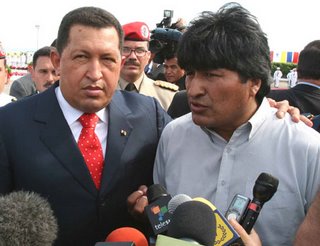
Popular support for Bolivia’s Evo Morales and Venezuela’s Hugo Chavez is not so much a referendum for Marxism as it is repudiation for foreign exploitation. I suspect if market economies were inculcated into these nation’s electorate rather than the pure gain for corporate coffers, then Marxist ideology would be less popular.
Conservative elements are quite popular in Columbia. Columbia’s President Uribe is popular with his electorate. Brazil and Argentina have chosen not to make waves with Bolivia’s leftist President – for now. President Morales’ nationalization of his natural gas might irritate more than the European investors that will lose money. Brazil can expect a rise in cost of Bolivian imports of natural gas.
Bolivian President Morales faces another issue: the European investors actually managed the operations of the natural gas infrastructure in Bolivia. Without a sizable contract to continue to do so, there would be no profit in maintaining that infrastructure. It will be an expensive proposition for Bolivia to learn from scratch the operations of that industry managed by outsiders. Which in turn will slow down exportation, which in turn will bring in less money into the Bolivian Treasury: these are not good scenarios for the Bolivian electorate to profit immediately from Morales’ nationalization process.
The question to all this: What will the United States do with all this anti-American sentiment being propagandized by Marxist Latin Americans that currently only have favor because of perceived foreign exploitation? It may be too late to for a Venezuelan electorate to remove Chavez. He has taken the typical Marxist road of eliminating opposition and manipulating legal measures to ensure his continued rule.




No comments:
Post a Comment